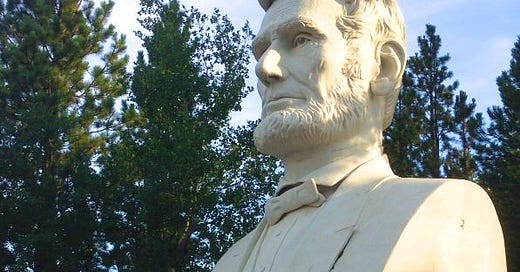Abraham Lincoln Predicted The Corporate Takeover Of Our Government 159 Years Ago
The threat of the money power of the country to stir prejudice and destroy the Republic
Photo by Mark Taylor / DeMOCKracy.ink
“We may congratulate ourselves that this cruel war is nearing its end. It has cost a vast amount of treasure and blood… It has indeed been a trying hour for the Republic; but I see in the near future a crisis approaching that unnerves me and causes me to tremble for the safety of my country. As a result of the war, corporations have been enthroned and an era of corruption in high places will follow, and the money power of the country will endeavor to prolong its reign by working upon the prejudices of the people until all wealth is aggregated in a few hands and the Republic is destroyed. I feel at this moment more anxiety for the safety of my country than ever before, even in the midst of war. God grant that my suspicions may prove groundless.”
— A letter from Abraham Lincoln to Col. William F. Elkins, dated November 21, 1864.
*****
Lincoln & Karl Marx: Mutual Admiration & Solidarity
At an earlier date — in 1843 — Marx himself had thought of immigrating to Texas, going so far as to apply to the mayor of Trier, his birthplace, for an immigration permit.
By Robin Blackburn
Jacobin (8/28/12)
Abraham Lincoln, as president, chose to reply to an “Address” from the London-based International Workingmen’s Association. The “Address,” drafted by Karl Marx, congratulated Lincoln on his reelection for a second term. In some resonant and complex paragraphs, the “Address” heralded the world-historical significance of what had become a war against slavery. The “Address” declared that victory for the North would be a turning point for nineteenth-century politics, an affirmation of free labor, and a defeat for the most reactionary capitalists who depended on slavery and racial oppression.
At an earlier date — in 1843 — Marx himself had thought of immigrating to Texas, going so far as to apply to the mayor of Trier, his birthplace, for an immigration permit.
Lincoln saw only a tiny selection of the avalanche of mail he was sent, employing several secretaries to deal with it. But the US Ambassador in London, Charles Francis Adams, decided to forward the “Address” to Washington. Encouraging every sign of support for the Union was central to Adams’s mission. The Emancipation Proclamation of January 1863 had made this task much easier, but there were still many sections of the British elite who sympathized with the Confederacy and some who favored awarding it diplomatic recognition if only public opinion could be brought to accept this.
The “Address” carried, beside that of Marx, the signatures of several prominent British trade unionists as well as French socialists and German social democrats. The Ambassador wrote to the IWA, explaining that the president had asked him to convey his response to their “Address.” He thanked them for their support and expressed his conviction that the defeat of the rebellion would indeed be a victory for the cause of humanity everywhere. He declared that his country would abstain from “unlawful intervention” but observed that “The United States regarded their cause in the present conflict with slavery-maintaining insurgents as the cause of human nature, and they derived new encouragement to persevere from the testimony of the working men of Europe.” …
https://jacobin.com/2012/08/lincoln-and-marx







You've got a good point. He was probably related to the Dulles brothers or J. Edgar Hoover.
Old Abe nailed it, didn't he? If John Wilkes Booth didn't assassinate Lincoln, who know what might have happened? Lincoln read Marx & Engels, who both supported the Union during the Civil War. He may have tried to move the country in a more socialist direction.
And some industrialist or banker would have found another John Wilkes Booth.